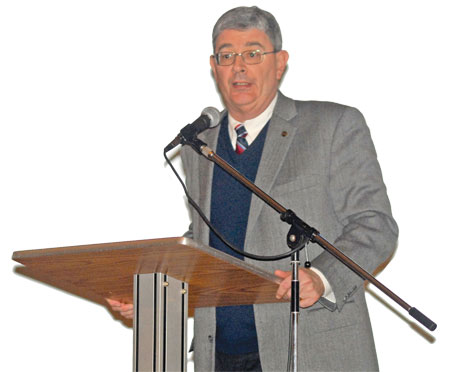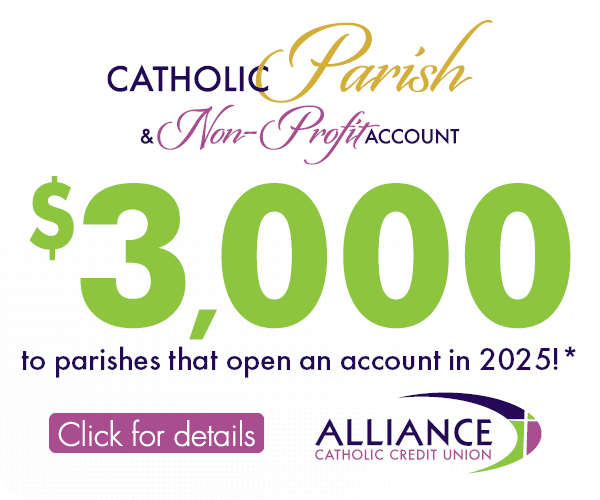 George Weigel speaks Jan. 24 to the Fellowship of St. Paul at Sacred Heart Major Seminary.
George Weigel speaks Jan. 24 to the Fellowship of St. Paul at Sacred Heart Major Seminary.Detroit — George Weigel once passed a “huge Pentecostal mega-church” while driving on a highway, and noticed identical signs at every exit reading “You are now entering mission territory.”
“You are entering mission territory,” repeated Weigel in his presentation at Sacred Heart Major Seminary in Detroit the evening of Jan. 24. “Not a bad idea for Catholic parishes.”
Weigel was in town for the following day’s Life is a Gift Conference at the seminary, and gave a special presentation to the student and faculty members of the Fellowship of St. Paul, a prayer group at the seminary.
“The more you give the faith away, by offering it to others, the more it grows within you,” said Weigel, a Catholic theologian and author of “Witness to Hope: The Biography of Pope John Paul II” as well as newly published “Evangelical Catholicism: Deep Reform in the 21st-Century Church.”
Origins of the transition
Weigel said that however the five decades following the Second Vatican Council may be interpreted, “it has surely been a time of transition,” although “it’s not always clear what the transition has been from, and what the transition is to.”
He explained that in order to fully understand this 50-year period, Catholics need to widen their lens to see the origins of this transitory time — the late 19th century.
Pope Leo XIII, whom Weigel described as “perhaps the most underrated figure of modern Catholic history,” was elected after the death of Pope Pius IX, who served the longest-recorded pontificate at 32 years.
Leo was 68 years old upon his election in 1878, elderly by the period’s standards, and expected to “keep the seat warm” for a few short years before leading the way for a successor who would offer a better generational shift.
He surprised the College of Cardinals, however, not only with the second-longest pontificate in recorded history, but with how active he was during his 25 years as pontiff.
“At the very beginning of his pontificate in 1878, at a time when much of the Western world — at least in its high cultural aspects — thought the papacy was a spent force in human affairs and the Catholic Church probably was, too, Pope Leo XIII took the bold strategic decision” to engage modern society, but with distinctly Catholic tools, Weigel said.
“The idea was not to surrender to modernity; it was to engage modernity in order to convert modernity,” he added.
Weigel said Leo began the slow process by which the Catholic Church would follow its way to a Catholic theory of human rights, democracy and religious freedom: “Leo put all of this energy in motion.”
Providing the keys
In 1959, shortly after his own election, Pope John XXIII announced the 21st ecumenical council in the history of the Church “in order to focus that energy that had been unleashed … in the hope of creating the conditions for what (he) called a New Pentecost.”
Weigel explained that Vatican II produced 16 documents, but unlike every other general council in Church history, “it did not provide the keys to its own authentic interpretation.”
But then, after 20 years of confusion, “the Holy Spirit raised up two popes who were both men of the Second Vatican Council,” he said. One was a Polish bishop; the other was a German theologian.
The pontificates of John Paul II and Benedict XVI offered a single arc of interpretation of Vatican II, Weigel said: “They provided the keys.”
And the keys, or the thread that wove the 16 documents together, is “the idea that the Church is a communion of disciples in mission.”
New Christian mission
In the past, Weigel explained, the cultural air of society helped transmit the faith. Even in areas that were not as “Catholic,” the general attitude wasn’t “toxic” to biblical religion and its idea of the human person and relationships.
“That is no longer the case,” he said.
“The only Catholicism that has a future in the Western world is the evangelical Catholicism which is rediscovered friendship with the Lord Jesus Christ as the center of the Christian life,” he said, adding the “Christian mission as the focus of our lives — every day in every circumstance.”
Following Pope John Paul II and Pope Benedict XVI’s call to “put out into the deep,” Pope Francis uses a different image but is speaking the same language in referencing the Church as a “field hospital after a battle,” Weigel said.
Peter Williamson, seminary theology professor and faculty adviser of the Fellowship of St. Paul, said he was encouraged by Weigel’s words, which he said gave “a vision of the big picture.”
Deacon Andy LaFramoise, a Sacred Heart seminarian from the Diocese of Saginaw, said the two words “evangelical” and “Catholicism” aren’t usually heard together.
“But we are called to be rooted in the Gospel and draw strength from the Scriptures on a daily basis as Catholics,” he said. “We are called to be missionaries, not in a way that’s antagonistic, but as authentic witnesses.”
Thomas Shaheen, a layman working on his master’s degree in theology at the seminary, said Weigel’s lecture was a “highlight” to the fellowship’s monthly meetings.
“There is a great deal of work to do to evangelize the culture, and Weigel drove home the point that it is every Catholic’s responsibility to do so,” he said.
Listen in
An audio version of George Weigel’s Jan. 24 presentation at Sacred Heart Major Seminary is available at www.shms.edu/news-and-events.








